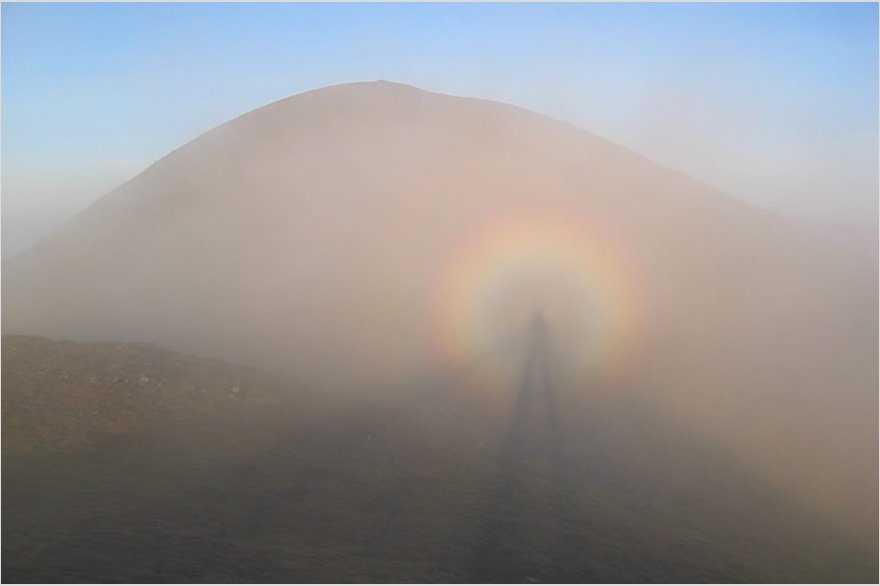English Lake District Glory
English Lake District Glory: A Spectacular Atmospheric Phenomenon
The English Lake District is renowned for its breathtaking natural beauty, with its rolling hills, serene lakes, and picturesque landscapes. However, the region is not only a haven for nature lovers but also a hotspot for fascinating atmospheric optics phenomena. One such phenomenon that graces the skies of the Lake District is the glorious display known as the "English Lake District Glory."
What is the English Lake District Glory?
The English Lake District Glory is an optical phenomenon that occurs when sunlight interacts with water droplets or ice crystals in the atmosphere. It manifests as a circular array of concentric rings of colors surrounding the shadow of an observer, creating a halo-like effect. The phenomenon gets its name from its frequent occurrence in the Lake District, where the unique combination of topography and weather conditions contributes to its regular appearance.
How Does the English Lake District Glory Form?
To witness the English Lake District Glory, specific conditions must align. Firstly, there needs to be a source of light, typically the sun, positioned behind the observer. Secondly, there must be a layer of water droplets or ice crystals suspended in the air. These tiny particles act as prisms, refracting and dispersing sunlight into its component colors. As the light rays pass through these droplets or crystals, they undergo multiple reflections and refractions, creating the characteristic rings of colors that form the glory.
The Role of Brocken Spectres in the English Lake District Glory
One remarkable feature often associated with the English Lake District Glory is the appearance of Brocken Spectres. A Brocken Spectre occurs when an observer's shadow is cast onto a cloud or mist bank, resulting in a magnified and elongated shadow surrounded by a halo-like glory. This adds an extra layer of enchantment to the already mesmerizing phenomenon.
Where Can You Witness the English Lake District Glory?
The English Lake District Glory is most commonly observed from high vantage points, such as mountain peaks or ridges, where the observer's shadow can be projected onto nearby clouds or mist. Popular locations in the Lake District for experiencing this phenomenon include Skiddaw Lesser Man and Skiddaw Little Man, where the combination of elevation and atmospheric conditions creates ideal circumstances for the formation of the English Lake District Glory.
The Colors of the English Lake District Glory
The rings of colors in the English Lake District Glory are a result of the light's interaction with the water droplets or ice crystals in the atmosphere. The innermost ring appears red, followed by orange, yellow, green, blue, indigo, and violet. These colors are reminiscent of a rainbow but arranged in a circular pattern around the observer's shadow.
Other Factors Affecting the English Lake District Glory
While the presence of water droplets or ice crystals is essential for the formation of the English Lake District Glory, other factors can influence its visibility and intensity. These include the size and shape of the droplets or crystals, as well as the angle at which sunlight interacts with them. Additionally, atmospheric conditions such as humidity and temperature play a role in determining whether or not the phenomenon will occur.
Capturing the English Lake District Glory
The English Lake District Glory is a fleeting phenomenon that requires precise conditions to manifest. To capture this stunning display, photographers often need to be at the right place at the right time. Patience, persistence, and a keen eye for atmospheric conditions are key to successfully photographing the glory. With the advancement of technology, high-quality cameras and lenses can help capture the intricate details of this ethereal spectacle.
Appreciating Nature's Wonders
The English Lake District Glory serves as a reminder of the beauty and complexity of our natural world. It offers a unique opportunity to witness firsthand the interplay between light, water, and the atmosphere. Whether you're a seasoned photographer or simply a lover of nature's wonders, witnessing the English Lake District Glory is an experience that will leave you in awe of the remarkable phenomena that occur right above our heads.
Conclusion
The English Lake District Glory is a captivating atmospheric optics phenomenon that graces the skies of the Lake District. Its formation relies on the interaction between sunlight and water droplets or ice crystals, resulting in a circular array of colorful rings surrounding the observer's shadow. The presence of Brocken Spectres adds an extra layer of enchantment to this already mesmerizing display. To witness the glory, one must be in a high vantage point, such as Skiddaw Lesser Man or Skiddaw Little Man, and be fortunate enough to experience the precise atmospheric conditions. Photographers can capture the spectacle by being patient, persistent, and well-prepared. Ultimately, the English Lake District Glory serves as a reminder of the intricate beauty of our natural world and offers a glimpse into the remarkable phenomena that occur in the skies above us.

A colourful glory surrounds the head of a Brocken Spectre. Ann Bowker (Mad about Mountains) saw this on Skiddaw Lesser Man looking towards Skiddaw Little Man in the English Lake District. ©Ann Bowker, shown with permission.
Note: this article has been automatically converted from the old site and may not appear as intended. You can find the original article here.
Reference Atmospheric Optics
If you use any of the definitions, information, or data presented on Atmospheric Optics, please copy the link or reference below to properly credit us as the reference source. Thank you!
-
<a href="https://atoptics.co.uk/blog/english-lake-district-glory/">English Lake District Glory</a>
-
"English Lake District Glory". Atmospheric Optics. Accessed on December 26, 2024. https://atoptics.co.uk/blog/english-lake-district-glory/.
-
"English Lake District Glory". Atmospheric Optics, https://atoptics.co.uk/blog/english-lake-district-glory/. Accessed 26 December, 2024
-
English Lake District Glory. Atmospheric Optics. Retrieved from https://atoptics.co.uk/blog/english-lake-district-glory/.